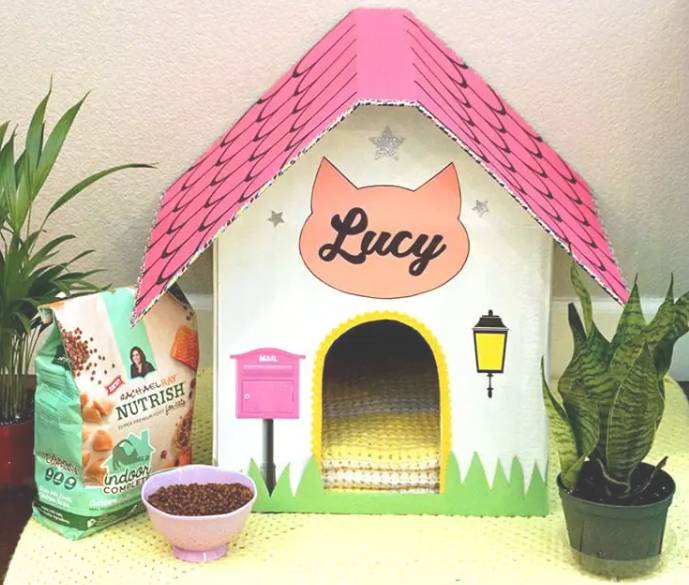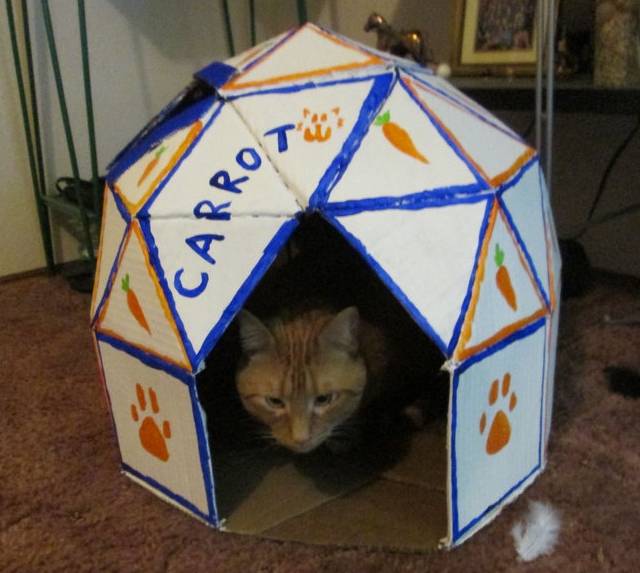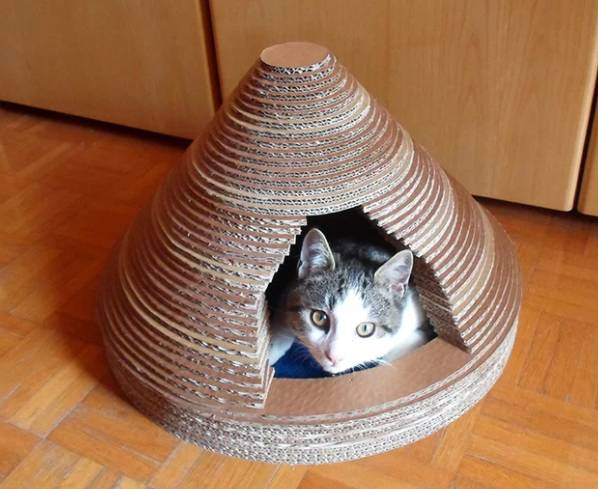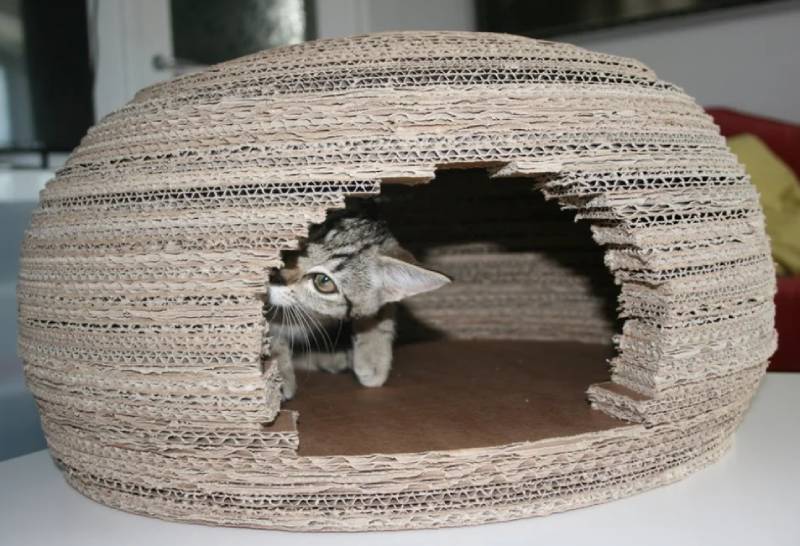If you have a cat, you know it can be very difficult to find toys that will entertain them for more than a minute or two. They often enjoy the packaging more than the toy, and you can spend a small fortune trying to make them happy. Many cats enjoy hiding places, and cardboard boxes are usually popular. If you are looking for a low-cost alternative you can build yourself, we can help you out.
The 15 DIY Cardboard Cat Houses
1. Kinder Mix Cat House
The Kinder Mix Cat House is a little more difficult than some of the other houses, but you should still be able to complete it in a few hours without requiring too many tools. The plan is free, and you can watch the complete step-by-step YouTube video to follow along. It’s highly customizable, and you can make it larger to accommodate more cats if you need to.
2. DIY Kitty Castle

Follow this DIY plan to construct a kitty castle worthy of the most royal felines out there. It uses most of the same supplies as other plans, but you simply make some creative cuts to include windows and an open upper space as well. The most creative inclusions are a banner and flag, which you can decorate to your heart’s content.
3. Cardboard Cat Playhouse

This apartment-style multi-level cat playhouse isn’t that hard to make, but some of the delicate cuts and gluing can be tricky to pull off. You can leave the inside space open if you prefer, but the plan calls for a printable paper door between the levels of the playhouse.
4. DIY Cardboard Cat House

A more traditional house design, this creative plan gives ideas for decorating the exterior with patterned washi tape and other paper decor. Printed paper “paint” is strictly optional, but we think it’s nice to at least paint your cat’s name on the outside. For extra credit, the mailbox and paper grass add a more natural look for very little work.
5. Gingerbread Cardboard Cat House

Your cat will love this festive holiday vacation house, complete with cotton balls and colored construction gumdrop roof paper. A holiday-themed sign is a must, but you can skip the mini Christmas tree if you don’t have the space. The house on its own is fairly compact and doubles as a nice decoration for the winter season.
6. Cardboard Cat Cave

Tap into your cat’s natural urge to locate a dark, private space with this homemade cardboard cat cave plan. The hardest part is ordering all the right cardboard panels, but luckily, the guide has a nice preset build for you. Adapting the plan to be smaller or larger would be challenging, but doable if you’re committed enough to downsizing or upgrading.
7. DIY Cat Camper

Real campers cost a lot of money, but this “Furstream” cat camper made of cardboard is nearly free with some commonplace craft supplies. Optional accents include a custom license plate, taillights, and maybe a custom flame paint job if your cat likes a little adventure in their spare time.
8. Conical Cardboard Cat House

Made of just corrugated cardboard, glue, and paint, your cat will love this conical teepee-style home. The rough corrugated edges are attractive scratching posts, too, so it serves multiple purposes. Decorate as desired, add a comfy cushion, and maybe install a mobile to spruce the place up. It has a rope-like appearance by default, but most craft paints should work to customize the look.
9. Cardboard Cat House With Chimney

Tired of basic plans? This twist on a classic uses some clever cardboard cutting and scissor work to craft a beautiful, scalloped roof with a faux chimney. Stuff some cotton balls in it to give the illusion of smoking or consider gluing some construction paper around the outside for more personalized decor.
10. Cardboard Cat Complex
This open-ended video tutorial produces an exciting cardboard property for your cat to explore and play in. There’s a main house with large decorative embellishments, a neat little porch, and a little guest house for when your cat has buddies over. The plan is sparse on details, but it’s easy to follow along with frequent pausing.
11. DIY Cardboard Kitty Cottage

As nice as it looks, you’d be surprised how easily you can make one of these kitty cottages from spare boxes you have lying around your house. A spool of sisal rope adds a tactile element to the house, string functions as a barebones mobile, and you can always add more toys if you want as well.
12. Chewy Box Cat Castle

Ostensibly for Chewy boxes, you can make a cat castle like this out of nearly any boxes of similar dimensions. Using themed boxes does help enhance the overall look of the castle when you’re done, but you could always just paint over it instead if you really wanted to.
13. Mid-Century Cardboard Cat House

Some of the other plans are kind of vanilla, but this elegant cat house is both easy to craft and looks incredible. You’ll just have to take a little more care when making your cuts, but you can adapt the design if you mess up. As long as your finished angles look nice, you can shift things to fit your tastes.
14. Cardboard Cat Igloo House

Cats just love the ragged edges of corrugated cardboard, so here’s a cardboard igloo house to try your hand at. This is best reserved for if you have tons of the stuff already because it takes a surprising amount of layers to get a solid house. You also have to think about how long it’ll take to glue because every single layer needs glue.
15. Cardboard Cat House with Scratcher

Young kittens and avid scratchers alike will adore this cat-shaped kitty house, which has large cat ears as scratching posts. If that’s not adorable enough for you, you can skip the paw print cutout and add your cat’s name or alter the decor as you see fit.
Summary
We hope you have enjoyed looking over this list and found a few card box projects you think your cat will like. If you intend to give one a try, please share this DIY Cardboard Cat House on Facebook and Twitter.
See also:
- 10 Amazing DIY Cardboard Cat Trees You Can Create at Home (With Pictures)
- 11 DIY Cat Tent & Teepees You Can Make Today (With Pictures)
Feature Image Credit: New Africa, Shutterstock
Contents
- The 15 DIY Cardboard Cat Houses
- 1. Kinder Mix Cat House
- 2. DIY Kitty Castle
- 3. Cardboard Cat Playhouse
- 4. DIY Cardboard Cat House
- 5. Gingerbread Cardboard Cat House
- 6. Cardboard Cat Cave
- 7. DIY Cat Camper
- 8. Conical Cardboard Cat House
- 9. Cardboard Cat House With Chimney
- 10. Cardboard Cat Complex
- 11. DIY Cardboard Kitty Cottage
- 12. Chewy Box Cat Castle
- 13. Mid-Century Cardboard Cat House
- 14. Cardboard Cat Igloo House
- 15. Cardboard Cat House with Scratcher
- Summary












